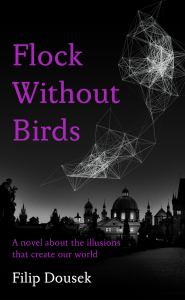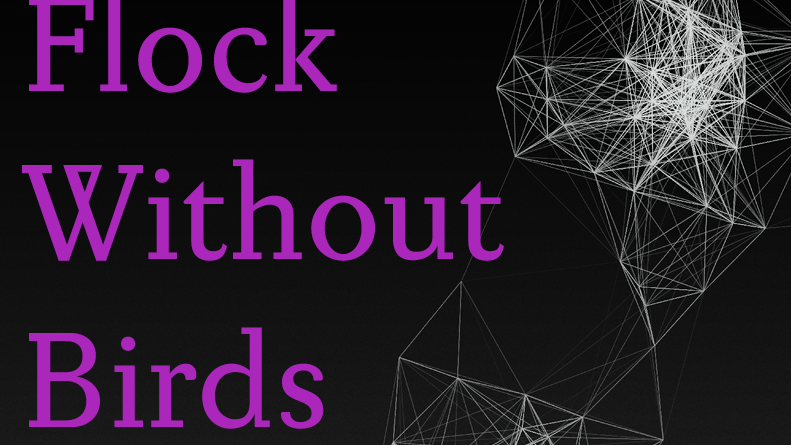Flock Without Birds
The Baltimore Post-Examiner is proud to present an excerpt from Filip Dousek’s book Flock Without Birds. Amazon describes the book as follows: “…an aging philosopher tells the tale of the Book–a tale of love that spans centuries, continents, and precious texts. Adam, who will one day write the Book, is a young PhD student torn between love and his obsession–coding an algorithm to sift the world’s data and find God, dead or alive. But a series of mysterious paintings lead him on a winding journey from Cambridge through a Faustian bargain to the edge of reason. Meanwhile in his library, Toito the philosopher calls into question everything there is to believe about Adam–and our world.
The Book–Adam’s journal from a foreign prison–promises to cure the divisions that plague the world. Their root cause isn’t politics, capitalism, race, religion, or media. A deeper layer, obvious and invisible, forms what we think, believe, and do. It shapes our wars and our relationships. Unless we confront these illusions, we will remain slaves to the obvious and lose the greatest freedom–the freedom to create a different world. The code–and the key–is within the human mind. But will Adam himself manage such a feat? Can he escape the prisons of the body and of the mind, and regain his love?”
It took him 12 years to complete and tell the story of a Cambridge PhD coding AI to find God, the order of the Universe, or at least the mother of all fractals. It was also about the centurial paradigm shift from objects to relationships and how it will change everything we know. In short, he wrote Flock Without Birds as fiction. A few years later, he built Stories and made it reality. For more information about the author, please visit https://www.
Praise for Flock Without Birds:
CHAPTER ONE
The rich tend to mistake their bank accounts for self-worth. The famous, their number of fans. The beautiful, their daily approaches from strangers. The muscular, their body mass. The orderly, their punctuality. The intelligent, the number of their quips. Such a variety of scales—and one thing in common: they all use a scale that favors them. Indeed, many find it easier to measure themselves by the number of problems they don’t have to solve, rather than the number of problems solved.
As for me, it’s been my feeling for quite some time that it isn’t money, fans, or muscles that make us human. When I searched for a more appropriate measure of life—eager to weigh human life by its own intrinsic value—I sought its core. And, in my view, there is nothing more intrinsic to human nature—and, therefore, no better (more general, more natural, more elementary) measure of human quality—than one’s progress along the axis of awareness (exploration, understanding).
This is not a heady academic phrase. I have myself embarked on this existential adventure, guiding my cognition toward its most essential and basic subject, the self—literally, that is. When you turned back to Europe, I headed forward, toward the unseen end of existence.
 This is the diary of the days that followed, conveyed in the simplest language I could muster. If there were an ideal dialect beneath these pages, it would feel rugged and unpolished as kutani-yaki pottery.
This is the diary of the days that followed, conveyed in the simplest language I could muster. If there were an ideal dialect beneath these pages, it would feel rugged and unpolished as kutani-yaki pottery.
Hardened by fire, brittle.
When the West runs into philosophical difficulties, it likes to hop on a plane to Delhi, take a bus to an ashram, and get its grey matter washed white with koans. It’s become something of a beaten path. “Forget words,” says its signpost. “Wisdom leaves through dialogue but comes by silence.”
Some pilgrims return smirking, confiding that the East is largely a fraud. They sink back to the paradoxes of the West, this time consoled by the knowledge that there is no escape. Others, by their own accounts—and I actually trust them—do glimpse a different order of the world. Typically, they return suffering speech blackouts. They respond to questions with an array of sighs, knowing smiles, vague allusions to “epiphany,” incoherent parables, and a general paralysis of explanatory skill. Such is the curse of the Eastern path: where one enters without words, one must also leave without them.
The Western path, on the other hand, is the path of the word. This is the path I have striven to follow, for I am a Westerner to the core. The printing press, the dialogue, and the skeptical attack are as much a part of my method of advance as the repeatable experiment.
⌘
Let me start where we left off—on the day you left Japan. After two years, you’d finally had enough Japanese sediment. You were ready to return to Europe. Return home, despite having no home. And I told myself that while you were a traveler, I’d gradually awakened the adventurer within. I had to finish Faustomat and see where that would take me. Without limits. Without you. For once, I felt ready to live the life of Marquis. I admit it. So you hugged me at Narita International Airport and really didn’t want to cry—and you managed. I slipped the cosmic order stamp into your pocket and walked through the glass doors to the escalators. I returned to our apartment, which was now missing all of your things. I found the stamp back in my pocket when I reached for my keys. You always were a step ahead.
It took me precisely six days to get tired of Japan. You had managed to take all the colors with you. In the following months I grew somber and translucent, but on the sixth of April (much later than expected), Faustomat was finished. I released the final version onto the cloud, set up alerts to frantically text me when the code hit on the mother of all fractal correlations, and forgot about it.
That was the time when I started reading anything I could get my hands on. I switched from Kant’s philosophy to Marlowe’s Doctor Faustus, logical paradoxes, fractal modelling, supersymmetric quantum mechanics, Bohm’s holographic universe, information theory, Elliott’s market waves, the rise and fall of Eastern empires, and the Japanese art of composition. I devoured data like I was trying to compete with Faustomat. We were both crawling through the internet, desperately craving grand symmetries. I made it clear to myself that the only alternative to resolving those old riddles was brain damage. I packed my skull with paradoxes and let it broil like a pressure cooker. It was another six weeks before it blew up.
⌘
Here in Darjeeling, people gather in one hut in the evenings. They cook, weave, draw mandalas for tourists, and share stories. It’s almost as sublime as it sounds. I enjoy listening as they talk of gods and beasts, of Milarepa, Buddha, and King Ashoka, the same story many times over.
Once, they asked if I would like to tell a story too. I was shy— I don’t know any stories. I was a scientist, I protested. And they said, “Tell us a story about science, then.”
Blushing, I began telling them about one of my few heroes. He lived in a time when the scientific method was only emerging, and he fought fiercely over its form. This man was Denis Diderot, who in 1764 converted a routine commission for the translation of a two-volume English encyclopedia into a grandiose attempt to consolidate the knowledge of the Enlightenment into thirty-five volumes of the Encyclopédie, to which he ended up devoting two decades. His associate Jean le Rond d’Alembert wrote of their time:
“In short, from the Earth to Saturn, from the history of the heavens to that of insects, natural philosophy has been revolutionized; and nearly all other fields of knowledge have assumed new forms.”
The two men set out to order the discordant fruits of the new paradigm. They planned to collect the new thought, solidify its foundations, and review, renew, and rewrite the various sciences under the new model. It was the kind of total reordering that typically happens after a paradigm shift.
They hired an army of experts. Diderot paid for thousands of engravings of various mechanical processes in Parisian workshops, so as to allow others to replicate them, directly spurring the industrial revolution. D’Alembert authored over fifteen hundred articles; Diderot, spearheading the enterprise, penned an incredible six thousand. In the first volume, eagerly expected by the period’s elite, Diderot wrote on anatomy, arithmetic, and art but also on aristocracy and authority. “No man has received from nature the right of commanding others,” wrote this audacious subject of the French monarch, instantly landing on a shortlist of state enemies.
Not only did he criticize the lack of liberties, capital punishment, and slavery, but he devoted more space to the manufacture of enamel than to the doctrine of the Trinity, and in the entry on Noah’s ark, the chief concern seemed to be the incredible effort required to shovel away all the manure. The Jesuits, the court, and the censors alike scrambled to put an end to the provocation. Diderot was jailed for three months for raising the question of God’s existence, and, in d’Alembert’s words, the establishment was “piling up the faggots at the seventh volume to cast them into the fire at the eighth.”
But as the censors were sanitizing the entry on Oppression, Diderot provoked with Sovereignty; they censored Infidelity, he penned Lust; they turned to Morality and he was raising hell with Tolerance; they cut out most of Theology and he gave them Objection, Philosophy, Sceptic, and Christian Sects.
Meanwhile, a second battlefront emerged, no less intense, which Voltaire called a civil war between the heathens. It raged in the French Academie, in the salons of Paris, and above all in the articles of the Encyclopédie. Both editors were united in a joint anti-clerical campaign and they both stressed that the proper way to explore the world was through the scientific method. But, in an ominous turn of history, they soon realized that their visions thoroughly diverged, representing two strikingly incompatible interpretations of the Enlightenment.
“The study of nature is the study of the properties of bodies; and their properties depend on two things: their movement and their shape.”
That’s how simple the Universe was according to d’Alembert. He was a mathematician, a geometer. When he closed his eyes, he could see the grand astronomical clockwork ticking moment after moment, turning planets and destinies alike according to unchanging laws. He sensed the plan behind the machine and sought to grasp it from first principles, the most abstract of concepts, like Descartes and Newton before him. To him, matter was fully inert; motion was external to it. This view of the Enlightenment left a good deal of space for God (as a causa causalis, the source of motion). And where there was space for God, there was space for Church and King. This was a direct continuation of the established Aristotelian thought model, simply with a higher emphasis on individual reason than revealed truth.
Now Diderot was a biologist. A chemist. One almost wants to say an al-chemist, in the original sense of the word: an explorer fascinated by the bubbling, shape-shifting chaos under his hands, its transformations, evolutions, and endless change. He laughed at the idea that geometrical laws could describe the complexity of the world, and aimed to study this complexity directly, without reference to idealized principles. In his experiments, he did not observe a division between matter and motion; he observed them together.
D’Alembert attracted the fascination of the public with his Discours Preliminaire, in which he put forward the idea that first principles might ultimately be arrived at by mathematicians (long before Hilbert resurrected this old hope and Gödel put it to its final rest). Diderot retorted in Geometry. Rather than a divine principle, he described geometry simply as a human simplification of nature, scoring against d’Alembert on his home field. Then the French government banned the work altogether and d’Alembert, exhausted by the constant controversy and danger, withdrew as co-editor.
Diderot, the ultimate freethinker, assumed exclusive responsibility for the now clandestine project. He wrote more intensely than ever, including the decisive entries Encyclopedia and Philosopher. He continued sourcing the best minds of Europe, fought against his own publisher’s censorship, and eventually brought the Encyclopédie to a successful close. His heroism is undeniable. But Diderot’s scientific vision oscillated between materialism, vitalism (viewing all matter as equally conscious), and atheism, converging in a mystical wonder. He analyzed the nature of living organisms, memory, identity, consciousness, and society and argued against the clockwork universe, for the indivisibility of reality and the connectedness of all things.
His was a complex critique of the mechanistic Aristotelian status quo rather than a coherent philosophy, an attitude rather than a formal system. He was harder to grasp and far more controversial. This debate was not a discussion of particulars, nor a disagreement on abstract philosophical themes—this was a clash of two fundamental approaches to reality. In the end, d’Alembert’s mechanistic conception proved fitter for the times and solidified the position of Aristotelian thought in the West for a few more generations. And with it, linear causation became the hallmark of the scientific method, leading us to that strange belief that we can cut a part from the whole, like an organ from the body, and study it in isolation. If we do this with every part, every organ, goes the belief, we will reach a complete understanding of the body. That is our science. Aristotle’s and d’Alembert’s. In the meantime, folk wisdom suggests that the whole is more than the sum of its parts. But if that’s true, how do we account for this difference? What is a flock without birds?
And the people in the village giggled and demanded to hear this pivotal Western story again. I kept wondering how much of it they could understand. And what tiny fragment of meaning did I possibly grasp when they talked about King Ashoka?

Filip Dousek is an analytics and artificial intelligence (AI) pioneer. He was the founder and CEO of Stories.bi, one of the first startups to automate big data analysis. The company started a revolution in analytics and was ultimately acquired.

